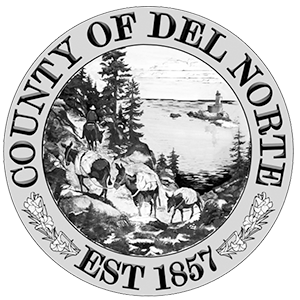Pest Management and Prevention
The Del Norte County Department of Agriculture is involved in a variety of programs to prevent the introduction and spread of invasive pests including plant quarantine enforcement, nursery inspections, insect detection trapping, invasive weed cleanup, and pest identification services.
Integrated Pest Management
Integrated pest management (IPM) is an ecosystem-based strategy that focuses on long-term prevention of pests or their damage through a combination of techniques such as biological control, habitat manipulation, modification of cultural practices, and use of resistant varieties.
IPM involves the use of non-chemical pest control methods and the careful use of least-toxic chemical methods when non-chemical methods have been exhausted or are not feasible. When IPM is properly implemented, chemical controls are used only as a last resort. They are used as spot treatments and are chosen and timed to have the smallest negative impact on non-target organisms and the environment.
The Del Norte County Department of Agriculture is available to help identify agricultural and household pests and will refer you to specific IPM articles for guidance on control methods. If you need assistance identifying a pest, please visit our Plant Pathology and Insect ID page for instructions on submitting samples to our office.
Further information on pest control methods for specific pests and their hosts are available at the University of California Integrated Pest Management website: http://ipm.ucanr.edu/index.html
Common Household Pest Articles
IPM Ants (PDF)
IPM Bedbugs (PDF)
IPM Cockroaches (PDF)
IPM Mosquitos (PDF)
IPM Termites (PDF)
Pest Detection
The Pest Detection program looks for the presence of Japanese beetles and spongy moths by placing traps throughout the County each year. If they became established, these pests could cause major economic damage to residential plantings, agricultural crops, forests, and rangeland. This program is largely funded by the California Department of Food and Agriculture and the United States Department of Agriculture.
Spongy Moth
The spongy moth, Lymantria dispar, is one of North America's most devastating forest pests. The species originally evolved in Europe and Asia and has existed there for thousands of years. In either 1868 or 1869, the spongy moth was accidentally introduced near Boston, MA. Since then it has spread throughout most of the contiguous United States.
The primary detection method for this invasive pest is through the use of pheromone traps which strongly attract the male moths, trapping them in a glue material. The detection of moths in traps would result in the placement of additional traps and/or egg mass surveys around the find locations. To date, spongy moths have not been detected within our county.
Resources
More information on spongy moths can be found at:
https://www.cdfa.ca.gov/plant/SpongyMoth_FlightedSpongyMoth/
Japanese Beetle
The Japanese beetle, Popillia japonica, is a serious pest of turf and ornamental plants. Grubs feed on the roots of grass and adults feed on the foliage of more than 300 plant species. Japanese beetles were first found in the United States in 1916, after being accidentally introduced into New Jersey. Until that time, this insect was known to only to occur in Japan, where it is not a major pest.
Early detection allows eradication efforts to begin before pests multiply and spread, becoming economically and technically impossible to control.
If you are interested in helping us guard against the introduction of these pests by having a trap placed on your property, please contact us at (707) 464-0878. Properties with lawns and roses are particularly attractive to Japanese beetles whereas spongy moths are associated with a variety of trees.
Resources
More information about Japanese beetles can be found at:
https://www.cdfa.ca.gov/plant/pdep/target_pest_disease_profiles/japanese_beetle_profile.html

